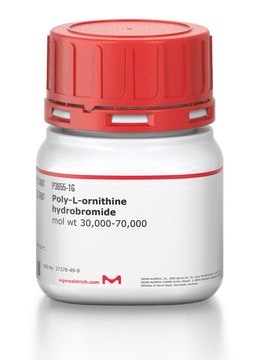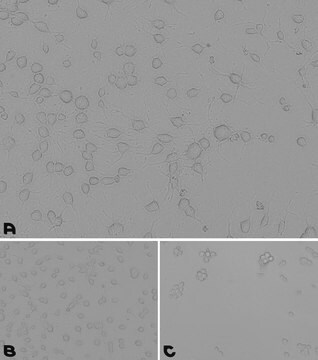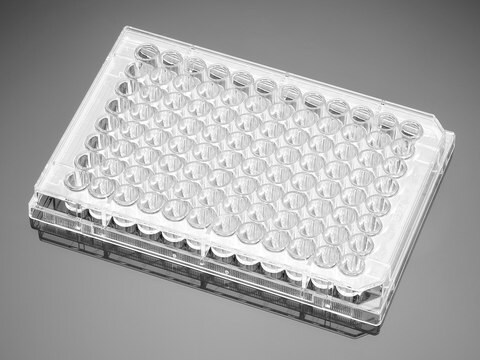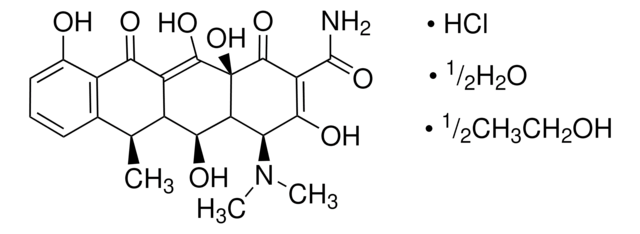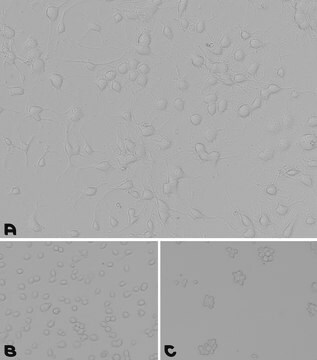Wszystkie zdjęcia(1)
Key Documents
LPLO001
Laminin/Poly-L-Ornithine Coating Solution
0.2 μm filtered, BioReagent, suitable for cell culture, Ready-to-use mixture
Synonim(y):
Attachment Factors, Coating Mix, Laminin, PLO, Poly-L-Ornithine
Zaloguj sięWyświetlanie cen organizacyjnych i kontraktowych
About This Item
Kod UNSPSC:
12352202
NACRES:
NA.25
Polecane produkty
Poziom jakości
sterylność
0.2 μm filtered
linia produktu
BioReagent
Postać
liquid
opakowanie
pack of 100 mL
metody
cell culture | mammalian: suitable
Warunki transportu
wet ice
temp. przechowywania
2-8°C
Opis ogólny
Laminin/Poly-L-Ornithine Coating Solution is a ready-to-use attachment factors mix solution, prepared in phosphate-buffered saline and is 0.2µm filtered. It is used to coat cell culture flasks, dishes, and multi-well plates and used to promote the attachment, spreading and proliferation of variety of cell types that require ECM-coated surface for adhesion and 2D cell-culture growth. The combination of Poly-L-Ornithine and Laminin is often used for attachment and promotion of many types of neuronal and neural stem cell cultures. It is suitable for culturing many different types of Peripheral Nervous System (PNS) and Central Nervous System (CNS) networks and is useful for promoting neural cell attachment and differentiation.
Zastosowanie
Laminin/Poly-L-Ornithine Coating Solution can be used in:
- Attachment and spreading of a variety of cell types
- Enhancement of neuronal cell attachment to plastic and glass
- Support of neurite outgrowth
- Suitable for use with serum-free or reduced -serum cultures
Działania biochem./fizjol.
Laminin proteins are integral components of structural scaffolding in animal tissues. Laminin has active domains for collagen binding, cell adhesion, heparin binding, and neurite outgrowth fragment. Laminin supports growth and differentiation of many cell types including epithelial, endothelial, neural, muscle and liver cells. Poly-L-Ornithine hydrobromide is a nonspecific attachment factor for cells, useful in promoting cell adhesion to solid substrates by enhancing electrostatic interaction between negatively charged ions of the cell membrane and the culture surface. After absorption to the culture surface, poly-L-Ornithine increases the number of positively charged cell binding sites
Komponenty
Laminin is a large basement membrane glycoprotein and composed of three different polypeptide chains, termed α, β and γ. The cohesion between these chains is the result of many inter and intrachain disulfide bonds. Together, they cause the molecule to look like a crucifix.
Poly-L-Ornithine hydrobromide molecular weight is >100,000 Da, a positively charged amino acid polymer.
Poly-L-Ornithine hydrobromide molecular weight is >100,000 Da, a positively charged amino acid polymer.
Uwaga dotycząca przygotowania
LPLO001 is a ready to use mixture composed of Laminin and Poly-L-Ornithine. It is filtered using 0.2µm filter. Gently mix the Laminin/Poly-L-Ornithine Coating Solution a few times to form a homogenous solution before use. For use as a coating solution, cover the entire culture surface area, approximately 0.2-0.25 mL/cm2. Incubate at room temperature for 2-3 hours and carefully aspirate the solution and wash 3 times with sterile PBS before plating cells. The coated tissue culture vessels can be used immediately or stored at 4 °C for up to one week filled with PBS and wrapped in parafilm. Remove PBS only when ready to plate the cells. Do not let the coated plates dry completely.
This page may contain text that has been machine translated.
Kod klasy składowania
12 - Non Combustible Liquids
Klasa zagrożenia wodnego (WGK)
WGK 1
Certyfikaty analizy (CoA)
Poszukaj Certyfikaty analizy (CoA), wpisując numer partii/serii produktów. Numery serii i partii można znaleźć na etykiecie produktu po słowach „seria” lub „partia”.
Masz już ten produkt?
Dokumenty związane z niedawno zakupionymi produktami zostały zamieszczone w Bibliotece dokumentów.
Nasz zespół naukowców ma doświadczenie we wszystkich obszarach badań, w tym w naukach przyrodniczych, materiałoznawstwie, syntezie chemicznej, chromatografii, analityce i wielu innych dziedzinach.
Skontaktuj się z zespołem ds. pomocy technicznej
